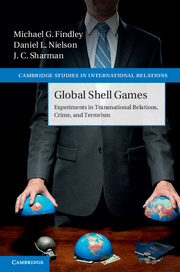Book contents
- Frontmatter
- Dedication
- Contents
- List of Figures
- List of Tables
- Preface
- 1 Introduction
- 2 Explaining the global shell game
- 3 Overall compliance, tax havens, OECD and developing countries
- 4 Terrorism and corruption
- 5 Laws and standards
- 6 Penalties, norms, and US origin
- 7 Conclusion
- Appendices
- References
- Index
Preface
Published online by Cambridge University Press: 05 June 2014
- Frontmatter
- Dedication
- Contents
- List of Figures
- List of Tables
- Preface
- 1 Introduction
- 2 Explaining the global shell game
- 3 Overall compliance, tax havens, OECD and developing countries
- 4 Terrorism and corruption
- 5 Laws and standards
- 6 Penalties, norms, and US origin
- 7 Conclusion
- Appendices
- References
- Index
Summary
Preface
A critic of the scientific approach to international relations might wonder how much “knowledge” has accumulated in half a century. In the pages of World Politics in 1966, Morton Kaplan defended the scientific method as the best means of studying international relations. Taking issue with E. H. Carr’s assault on science in The Twenty Years’ Crisis, Kaplan noted that the “traditionalist asserts that those who aspire to a ‘science’ of politics insist upon precision, rigor, quantification, and general theory. The traditionalist further claims that the complexity of international politics is such that these goals cannot be attained nor the important questions of international politics be investigated by these means” (Kaplan 1966: 7). Our sense is that this basic debate still seethes today with little resolution. This book is an attempt to move the discussion forward.
Advocates of science as a means to understanding international politics face at least two significant challenges. First, transnational relations is, in effect, infinitely complex – many millions of individuals, firms, organizations, and agencies from different countries and international organizations interact daily. Second, progress in the science of international relations requires the identification of causal effects, and observational scientific methods can only suggest correlations. The target is thus much too big, the instrument much too limited. In this book we argue that the first problem contains the answer to the second: the sheer number of transnational actors can serve as subjects in field experiments capable of revealing causal effects in international relations. The vastness of transnational interactions thus offers the means for precisely testing important theories of international relations.
- Type
- Chapter
- Information
- Global Shell GamesExperiments in Transnational Relations, Crime, and Terrorism, pp. xiii - xviPublisher: Cambridge University PressPrint publication year: 2014



